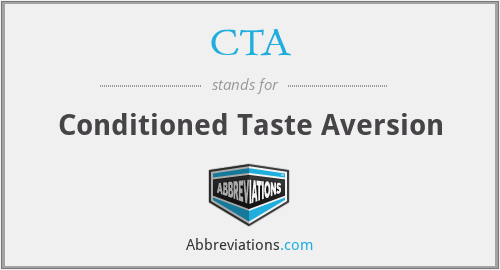What does CTA mean in Unclassified?
This page is about the meanings of the acronym/abbreviation/shorthand CTA in the Miscellaneous field in general and in the Unclassified terminology in particular.
Conditioned Taste Aversion
Submitted by S4Bot on May 31, 2020
Translation
Find a translation for Conditioned Taste Aversion in other languages:
Select another language:
- - Select -
- 简体中文 (Chinese - Simplified)
- 繁體中文 (Chinese - Traditional)
- Español (Spanish)
- Esperanto (Esperanto)
- 日本語 (Japanese)
- Português (Portuguese)
- Deutsch (German)
- العربية (Arabic)
- Français (French)
- Русский (Russian)
- ಕನ್ನಡ (Kannada)
- 한국어 (Korean)
- עברית (Hebrew)
- Gaeilge (Irish)
- Українська (Ukrainian)
- اردو (Urdu)
- Magyar (Hungarian)
- मानक हिन्दी (Hindi)
- Indonesia (Indonesian)
- Italiano (Italian)
- தமிழ் (Tamil)
- Türkçe (Turkish)
- తెలుగు (Telugu)
- ภาษาไทย (Thai)
- Tiếng Việt (Vietnamese)
- Čeština (Czech)
- Polski (Polish)
- Bahasa Indonesia (Indonesian)
- Românește (Romanian)
- Nederlands (Dutch)
- Ελληνικά (Greek)
- Latinum (Latin)
- Svenska (Swedish)
- Dansk (Danish)
- Suomi (Finnish)
- فارسی (Persian)
- ייִדיש (Yiddish)
- հայերեն (Armenian)
- Norsk (Norwegian)
- English (English)
Definition
What does CTA mean?
- Conditioned taste aversion
- Conditioned taste aversion occurs when an animal associates the taste of a certain food with symptoms caused by a toxic, spoiled, or poisonous substance. Generally, taste aversion is developed after ingestion of food that causes nausea, sickness, or vomiting. The ability to develop a taste aversion is considered an adaptive trait or survival mechanism that trains the body to avoid poisonous substances (e.g., poisonous berries) before they can cause harm. The association reduces the probability of consuming the same substance (or something that tastes similar) in the future, thus avoiding further poisoning. It is an example of classical or "Pavlovian" conditioning. Studies on conditioned taste aversion which involved irradiating rats were conducted in the 1950s by Dr. John Garcia, leading to it sometimes being called the Garcia effect. Conditioned taste aversion sometimes occurs when sickness is merely coincidental to, and not caused by, the substance consumed. For example, a person who becomes very sick after consuming vodka-and-orange-juice cocktails may then become averse to the taste of orange juice, even though the sickness was caused by the over-consumption of alcohol. Under these circumstances, conditioned taste aversion is sometimes known as the "Sauce-Bearnaise Syndrome", a term coined by Seligman and Hager.
Popularity rank by frequency of use
How popular is CTA among other acronyms?
CTA#1#1876#12977
Embed
Citation
Use the citation below to add this abbreviation to your bibliography:
Style:MLAChicagoAPA
"CTA." Abbreviations.com. STANDS4 LLC, 2024. Web. 29 Apr. 2024. <https://www.abbreviations.com/term/2213655>.



Discuss this CTA abbreviation with the community:
Report Comment
We're doing our best to make sure our content is useful, accurate and safe.
If by any chance you spot an inappropriate comment while navigating through our website please use this form to let us know, and we'll take care of it shortly.
Attachment
You need to be logged in to favorite.
Log In